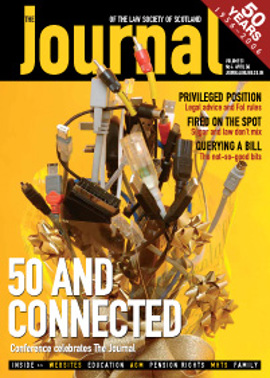Qualifying by degrees

The pre-Diploma route
For decades, the majority of intrants to the solicitor branch of the legal profession have arrived at the Society’s door in possession of a Bachelor of Laws degree. While graduating LLB has remained the preferred route for most intending solicitors, it is not the only route to qualification. Indeed, for some, and for varied reasons, a three or four-year full time degree course or a six-year part time course, may not be feasible options. At the time of writing, 30 individuals are registered with the Society as “pre-Diploma trainees”. This group of people intend to qualify by means of the Society’s own professional exams while undertaking a three year traineeship in a solicitor’s office.
The 30 pre-Diploma trainees are at various stages of their three-year contract and of presentation for exams, from nearing discharge to having recently registered the contract. The fact that one third have recently commenced training is an illustration that the pre-Diploma route remains a viable option to qualification. It is by no means an easy route. The Society sets a syllabus and reading list, but provides no tuition and the trainees “self study” their way through the eight required examinations. Nor is it a fast-track route to qualification; after completing the three years in an office, both the Diploma in Legal Practice and the two year post-Diploma traineeship are required of them. What is available to the trainees, however, is the exposure to an office environment, to “live” cases and to the guidance and expertise of the qualified solicitors they work with in the office setting.
Accreditation: the rationale
With 10 universities in Scotland either accredited or recognised by the Society to offer a Scots law LLB, the number of students embarking on an LLB degree each year is over 1,000 and probably nearer 1,200, greatly outweighing those qualifying through pre-Diploma training.
There has been comment in these pages in recent issues concerning who should be teaching the LLB degree. In considering its stance, the Society must be alert to the fact that, with such numbers, the LLB degree is not only a component in a solicitor’s training, but for many, whether through intention or not, a highly regarded qualification in the general job market. There have always been LLB students who graduated to professions other than law; numbers are now such that a higher proportion do so. This is not a “bad thing”, providing they were equipped at the outset with the information necessary to make an informed career choice.
Because the LLB continues to be both a professional and a general qualification, the Society’s interest in it, as stated in our accreditation guidelines, will not be as great as in the later stages of education and training, such as the Diploma in Legal Practice. But interest there is, and therefore we have an accreditation process which all LLB providers are required to undergo.
The accreditation guidelines
Previous comment centred on whether it was appropriate to allow the teaching of Scots law in our universities by teaching staff who are not professionally qualified in Scotland or who do not have a Scots law degree. The Society’s position is set out quite clearly in the accreditation guidelines. We require that teaching is delivered by staff who are appropriately qualified. The guidelines then list examples of appropriate qualifications, which are broadly drawn. Further, universities seeking accreditation are asked to ensure there is appropriate input from the legal profession to the teaching of the professional subjects.
The professional subjects are singled out on account of their equivalence to the Society’s own professional exams and in acknowledgment of the fact that, for almost half of all LLB students, their LLB will not be used as part of a solicitor’s qualification. The guidelines go on to state that, in relation to professional input, “it would be expected that suitably qualified members of the legal profession in Scotland would be involved in either the design, the delivery or the review of the qualifying programme and each of the professional subjects”. Each institution applying for accreditation will be required to satisfy the Society that it meets this requirement.
Pursuing best practice
It is acknowledged by the Society that there is less cross-over from the practising profession to academia than there may be in other professions or jurisdictions at undergraduate level, although there is significant input from practising solicitors to the Diploma. Some of the theories as to why universities do not or cannot recruit practising lawyers have been aired in previous issues. No doubt the true answer lies in some combination of factors, and views within both academia and practice will continue to differ.
In drafting the accreditation guidelines the Society’s staff have been engaged in a very constructive dialogue with representatives of heads of law schools, a model which we hope to build on in the future. We are certainly neither unaware of nor unsympathetic to the external and commercial pressures at play in 21st century universities. We face the challenge of balancing a range of competing interests within the profession and the universities, while ensuring that the overall process equips solicitors with the skills and knowledge they will require to meet client demands and expectations.
Training of solicitors must reflect best practice and we make no apology for having the process under constant scrutiny and review. One thing is certain: little will be achieved if we do not work together. For that reason we welcome the opening up of debate about education and training issues.Open Forum
Anyone interested in helping to shape the future of legal education and training in Scotland should consider signing up to our virtual consultation “Education Forum”. All who register will have the opportunity of responding to structured questionnaires to provide detailed feedback on key education and training projects. Further information and an application form are available from Chrissie Holroyd (christianholroyd@lawscot.org.uk or 0131 476 8273).
Liz Campbell, BA (Hons), MBA, ,Director (Education and Training)
In this issue
- Bias and mental health tribunals: a reply
- Legal science or law-lite? A response (1)
- Opening a binding global route for personal data
- Mentally disordered offenders
- Change but not for the sake of it
- Legal science or law-lite? A response
- On message
- A bill to query
- Client confidentiality and freedom of information
- Rushed law and wrongful death
- Qualifying by degrees
- Safeguards before the MHTs
- The treatment of pension rights on divorce
- We've paid for it: what do you mean it's not ours?
- Communication: the #1 risk management tool?
- Sugar but not sweet
- AGM report
- Guidance on guidelines
- The licensed trade: going up in smoke?
- Clause for concern
- Fully charged
- Scottish Solicitors' Discipline Tribunal
- Website reviews
- Book reviews
- New CAR drives discharge regime






